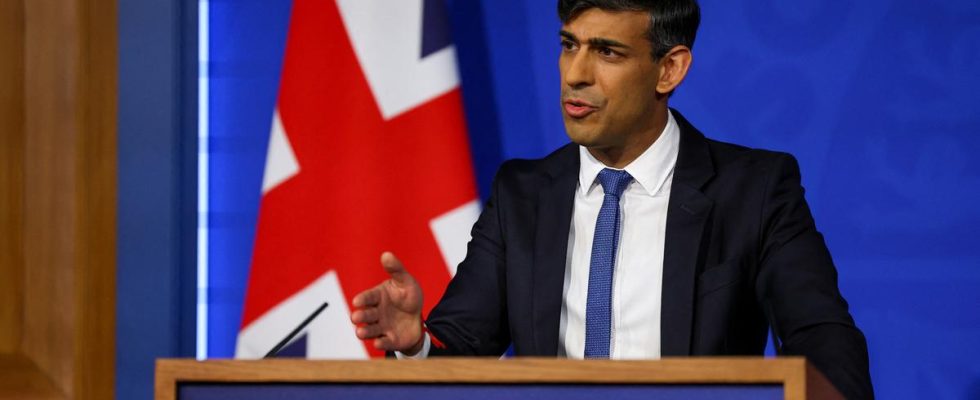Toby Melville / REUTERS
Announced two years ago by the conservative government of Rishi Sunak, this highly controversial law is presented as a flagship measure of its policy to combat illegal immigration.
The British Parliament approved on the night of Tuesday April 23 the controversial bill for the expulsion to Rwanda of asylum seekers who entered the United Kingdom illegally, after an interminable battle between the upper house, reluctant to face this controversial text , and the lower house. Announced two years ago by the conservative government of Rishi Sunak and presented as a flagship measure of its policy to combat illegal immigration, this project aims to send asylum seekers to Rwanda – wherever they come from. – entered the United Kingdom illegally, notably by crossing the Channel on inflatable boats.
Backed by a new treaty between London and Kigali which provides for the payment of substantial sums to Rwanda in exchange for welcoming migrants, the text debated Monday in Parliament aimed to respond to the conclusions of the Supreme Court, which had deemed the initial project illegal last November. In particular, it defines Rwanda as a safe third country. However, if Rwanda presents itself as one of the most stable countries on the African continent, its president Paul Kagame is accused of governing in a climate of fear, stifling dissent and freedom of expression.
“Parliamentary ping-pong”
The House of Lords, where the Conservatives do not have a majority, delayed the final adoption of the text by constantly sending it back to the House of Commons with amendments, which were in turn systematically rejected by the deputies. A delaying maneuver known as “parliamentary ping-pong”. The Lords notably wanted to demand that Rwanda not be considered a safe country until an independent monitoring body says so. They also wanted UK agents, allies and employees abroad, including Afghans who fought alongside British armed forces, to be exempt from deportation. In the end, the upper house, whose members are not elected, decided to comply with the will of the House of Commons designated by universal suffrage, and decided to no longer amend the text, guaranteeing its entry into force.
Earlier on Monday, Rishi Sunak assured that his government was “ready” to deport asylum seekers to Rwanda within 10 to 12 weeks, once the law is adopted. The stakes are also electoral for the Prime Minister, in power for 18 months, while the conservatives are largely the losers of the looming legislative elections. “We are ready”, “these flights will take off, no matter what”, the Prime Minister insisted in the morning during a press conference. The government has mobilized hundreds of staff, notably judges, to quickly process possible appeals from illegal migrants, and released 2,200 detention places for them while waiting for their cases to be studied. “Charter planes” have been booked, added Rishi Sunak, while according to media reports the government has struggled to convince airlines to contribute to the expulsions.
No foreign court will stop us from getting the planes off the ground. »
Rishi Sunak
“No foreign court will stop us from getting the planes off the ground”, insisted Rishi Sunak, repeating the mantra of the conservatives since the first expulsions to Rwanda were blocked by European justice. The government’s bill is strongly criticized by the Labor opposition, migrant aid associations, the head of the Anglican Church and even the UN High Commissioner for Human Rights Volker Türk , who felt that he will “against the fundamental principles of human rights”. On Monday, the United Nations special rapporteurs on human trafficking, migrants’ rights and torture warned that airline companies and authorities that facilitate affected flights “could be complicit in a violation of internationally protected human rights”.
In a statement to AFP, the general director of the Care4Calais organization Steve Smith judged the plan “impracticable”, “brutal” And “which will not succeed in putting an end to Channel crossings”. The government should “focus instead on the vital task of processing asylum applications fairly and quickly”, also reacted Enver Solomon, from the Refugee Council. After reaching a record in 2022 (45,000), then falling in 2023 (nearly 30,000), the number of people who crossed the Channel illegally aboard makeshift canoes has increased by more than 20% since the start of the year compared to last year.

